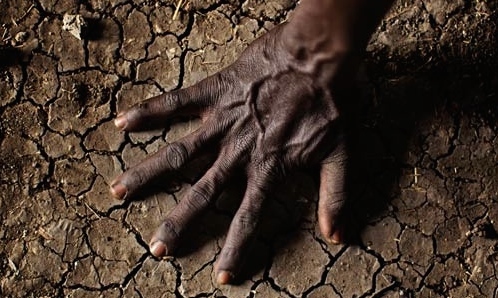Peak SOIL
Re: Peak SOIL
I always thought it a high virtue to reclaim soil. I don’t doubt your facts, I hear you saying what is possible. What I doubt is our commitment to make this possibility real.
-

Newfie - Forum Moderator

- Posts: 18501
- Joined: Thu 15 Nov 2007, 04:00:00
- Location: Between Canada and Carribean
Re: Peak SOIL
Climate-Induced Soil Changes May Cause More Erosion and Flash Flooding
Rivers and wells in post-flood Kerala dry up – Kilometers-long cracks in earth cause depletion of groundwater reserves
Soils Losing Fertility in Eastern Uganda
In a paper published Sept. 5 in Nature, the scientists studied the impact of climate change on macroporosity—the amount of large pores in the soil. Macropores, which are greater than 0.08 mm in diameter, allow water to be absorbed easily into the surrounding soil, where it can be used by plants, transport nutrients, and eventually make its way back into underground aquifers.
Using a large database of soils collected over 50 years from across the continental U.S. combined with atmospheric data from a network of weather stations, the researchers examined changes in macroporosity across a rainfall, temperature, and humidity gradient. They found macropores were more likely to develop in drier climates than humid climates, and that climate-related changes in macroporosity occur over shorter timescales than previously thought. The consequences could be less infiltration of water into the ground, more surface runoff and erosion, and more flash flooding.
"This is the first study to show that the development of macropores is influenced by climate at short timescales and it reinforces the hypothesis that climate change will probably intensify the water cycle," Hirmas said.
Daniel R. Hirmas et al, Climate-induced changes in continental-scale soil macroporosity may intensify water cycle, Nature (2018).
Rivers and wells in post-flood Kerala dry up – Kilometers-long cracks in earth cause depletion of groundwater reserves
Thiruvananthapuram, 13 September 2018 (PTI) – With mercury levels rising and abnormal drying up of rivers and wells reported in flood-hit Kerala, the state government has decided to conduct scientific studies on the post-flood phenomenon in the state.
Chief Minister Pinarayi Vijayan has directed the State Council for Science, Technology and Environment to carry out studies on the phenomenon after floods across the state and suggest possible solutions to the problems.
A series of issues including soaring mercury level, unprecedented dip in water level of rivers, sudden drying-up of wells, depletion of groundwater reserves and mass perishing of earthworms have caused widespread concern in various parts of Kerala after the devastating deluge last month.
The flood-battered Wayanand district, known for its rich biodiversity, recently witnessed the mass perishing of earthworms, causing concern among farmers who attributed it to the rapid drying up of earth and change in soil structure.
Many rivers including Periyar, Bharathapuzha, Pampa, and Kabani, which were in a spate during the days of flood, are now getting dried up and their water level has decreased abnormally.
Besides the drying up of wells, their caving in was also reported in many districts.
The flood had altered the topography of the land in many places and kilometres-long cracks had been developed especially in high range areas of Idukki and Wayanad which had witnessed a large number of landslides.
Soils Losing Fertility in Eastern Uganda
Bulambuli, Uganda - A study carried out by soil scientists from the Zonal Agriculture Research Development Institute (Zardi) at Buginyanya Centre in Bulambuli District, has revealed that soils in the eastern region have lost fertility due to over cultivation.
While addressing officials from Ministry of Agriculture at the centre on Monday, Ms Eseri Nankyam, a soil scientist warned that if no immediate measure is taken by the government, the region will face food insecurity.
“Soils are getting old and weathered, meaning they are becoming less productive due to over cultivation. This has impacted on the productivity of the crops in the region,” she said.
“The soils are usually eroded during torrential rains which leave the ground bare with unproductive layers. During landslides, most soils and nutrients are covered underneath,” she said.... “Less productivity means food insecurity and that is disastrous with the ever increasing population in the country”
Mr Lawrence Owere, a researcher and the principal of Buginyanya Zardi, said if nothing is done within 10 years, the region and the country at large will face massive hunger.
“If we don’t practise conservation methods, we shall have only stones left,” he said.
“There are three classes of people: those who see. Those who see when they are shown. Those who do not see.” ― Leonardo da Vinci
Insensible before the wave so soon released by callous fate. Affected most, they understand the least, and understanding, when it comes, invariably arrives too late.
Insensible before the wave so soon released by callous fate. Affected most, they understand the least, and understanding, when it comes, invariably arrives too late.
-

vox_mundi - Intermediate Crude

- Posts: 3939
- Joined: Wed 27 Sep 2006, 03:00:00
Re: Peak SOIL
https://undark.org/2018/09/11/vertical- ... od-crisis/
Vertical farming a solution?
Population growth and GW will minimize the food on the table.
Global Food crisis will hit long before 2050.
Vertical farming a solution?
Population growth and GW will minimize the food on the table.
Global Food crisis will hit long before 2050.
-

M_B_S - Intermediate Crude

- Posts: 3770
- Joined: Sat 20 Aug 2005, 03:00:00
Re: Peak SOIL
http://kticradio.com/agricultural/a-global-food-crisis/
A GLOBAL FOOD CRISIS?
BY Pat Melgares, K-State Research and Extension | September 12, 2018
***********
I disagree with the thesis thats all about statistic and that there is plenty of food in the world after GW and population bomb explosion after year 2030.
So Malthus Law will rule again.
M_B_S
A GLOBAL FOOD CRISIS?
BY Pat Melgares, K-State Research and Extension | September 12, 2018
***********
I disagree with the thesis thats all about statistic and that there is plenty of food in the world after GW and population bomb explosion after year 2030.
So Malthus Law will rule again.
M_B_S
-

M_B_S - Intermediate Crude

- Posts: 3770
- Joined: Sat 20 Aug 2005, 03:00:00
Re: Peak SOIL
Other related factors will also kick in, warns the report: deforestation from regional drying and warming, the effect of rising sea levels on cropland productivity in coastal regions, and growing water demand from larger populations.
Yet the report points out that a fundamental problem is the impact of human activities on the land itself, estimating that:
"... land degradation affects approximately 20% of the world's cultivated areas".
Over the past 40 years, about 2 billion hectares of soil - equivalent to 15% of the Earth's land area (an area larger than the United States and Mexico combined) - have been degraded through human activities, and about 30% of the world's cropland have become unproductive. But it takes on average a whole century just to generate a single millimetre of topsoil lost to erosion.
Soil is therefore, effectively, a non-renewable but rapidly depleting resource.
https://www.theguardian.com/environment ... ing-itself
"We are mortal beings doomed to die
-

onlooker - Fission

- Posts: 10957
- Joined: Sun 10 Nov 2013, 13:49:04
- Location: NY, USA
Re: Peak SOIL
Hi onlooker
The artikel is dated from 2013.
Now 2018 the facts are supporting it greatly.
MBS
The artikel is dated from 2013.
Now 2018 the facts are supporting it greatly.
MBS
-

M_B_S - Intermediate Crude

- Posts: 3770
- Joined: Sat 20 Aug 2005, 03:00:00
46 posts
• Page 3 of 3 • 1, 2, 3
Return to Environment, Weather & Climate
Who is online
Users browsing this forum: No registered users and 118 guests

